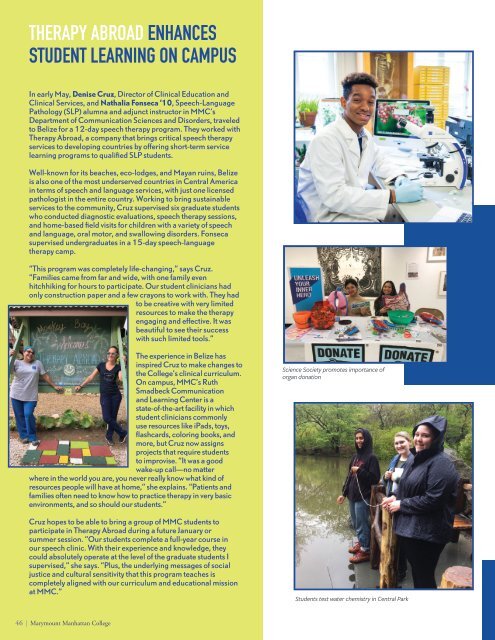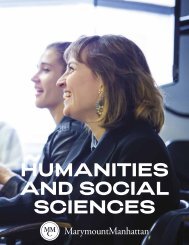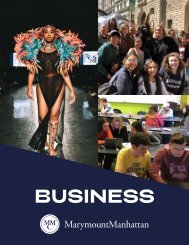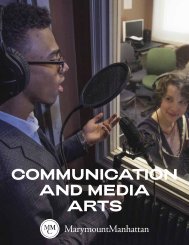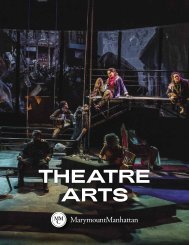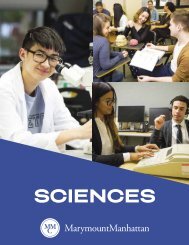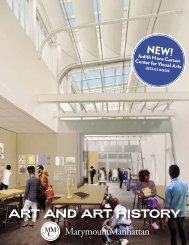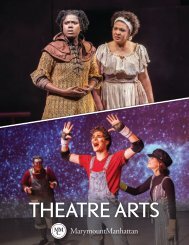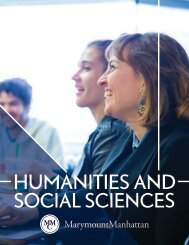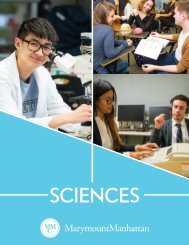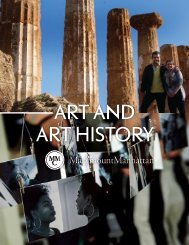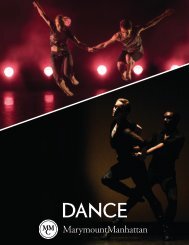Fall 2019 Magazine
Create successful ePaper yourself
Turn your PDF publications into a flip-book with our unique Google optimized e-Paper software.
THERAPY ABROAD ENHANCES<br />
STUDENT LEARNING ON CAMPUS<br />
In early May, Denise Cruz, Director of Clinical Education and<br />
Clinical Services, and Nathalia Fonseca ’10, Speech-Language<br />
Pathology (SLP) alumna and adjunct instructor in MMC’s<br />
Department of Communication Sciences and Disorders, traveled<br />
to Belize for a 12-day speech therapy program. They worked with<br />
Therapy Abroad, a company that brings critical speech therapy<br />
services to developing countries by offering short-term service<br />
learning programs to qualified SLP students.<br />
Well-known for its beaches, eco-lodges, and Mayan ruins, Belize<br />
is also one of the most underserved countries in Central America<br />
in terms of speech and language services, with just one licensed<br />
pathologist in the entire country. Working to bring sustainable<br />
services to the community, Cruz supervised six graduate students<br />
who conducted diagnostic evaluations, speech therapy sessions,<br />
and home-based field visits for children with a variety of speech<br />
and language, oral motor, and swallowing disorders. Fonseca<br />
supervised undergraduates in a 15-day speech-language<br />
therapy camp.<br />
“This program was completely life-changing,” says Cruz.<br />
“Families came from far and wide, with one family even<br />
hitchhiking for hours to participate. Our student clinicians had<br />
only construction paper and a few crayons to work with. They had<br />
to be creative with very limited<br />
resources to make the therapy<br />
engaging and effective. It was<br />
beautiful to see their success<br />
with such limited tools.”<br />
The experience in Belize has<br />
inspired Cruz to make changes to<br />
the College’s clinical curriculum.<br />
On campus, MMC’s Ruth<br />
Smadbeck Communication<br />
and Learning Center is a<br />
state-of-the-art facility in which<br />
student clinicians commonly<br />
use resources like iPads, toys,<br />
flashcards, coloring books, and<br />
more, but Cruz now assigns<br />
projects that require students<br />
to improvise. “It was a good<br />
wake-up call—no matter<br />
where in the world you are, you never really know what kind of<br />
resources people will have at home,” she explains. “Patients and<br />
families often need to know how to practice therapy in very basic<br />
environments, and so should our students.”<br />
Cruz hopes to be able to bring a group of MMC students to<br />
participate in Therapy Abroad during a future January or<br />
summer session. “Our students complete a full-year course in<br />
our speech clinic. With their experience and knowledge, they<br />
could absolutely operate at the level of the graduate students I<br />
supervised,” she says. “Plus, the underlying messages of social<br />
justice and cultural sensitivity that this program teaches is<br />
completely aligned with our curriculum and educational mission<br />
at MMC.”<br />
Science Society promotes importance of<br />
organ donation<br />
Students test water chemistry in Central Park<br />
Research as a<br />
Place of Discovery<br />
At the heart of MMC’s science<br />
programs is the faculty-student<br />
research relationship. Original<br />
research helps students experience<br />
firsthand the creativity and curiosity<br />
inherent in scientific exploration,<br />
as well as develop a high level of competence in their fields of interest<br />
while making genuine contributions to the scientific community.<br />
Benedetta Sampoli Benitez, Ph.D., Chair of the Division of Sciences and Professor of<br />
Chemistry and Biochemistry, is a champion of faculty-student research collaborations.<br />
“At larger institutions, undergrads might have a small role in a project, helping to collect<br />
or organize data,” she explains. “But at MMC, our students are involved in every step of<br />
the process, from beginning to end. At conferences and competitions, science faculty at<br />
institutions around the country are amazed that our students are only undergraduates—<br />
their level of work and ability to communicate findings are truly exceptional.”<br />
Across the scientific disciplines at MMC, students are highly encouraged and often actively<br />
recruited to engage in faculty-mentored research projects. In addition to developing<br />
crucial laboratory and presentation skills, students frequently appear as co-authors on<br />
original publications—a rarity at the undergraduate level.<br />
For example, Jessica Krimgold ’19 and Ailyn Gomez ’19—both Speech-Language Pathology<br />
and Audiology majors and Language Science minors—will be published in the peer-reviewed<br />
journal Research and Teaching in Developmental Education this year alongside<br />
Sue Behrens, Ph.D., Professor and Chair of the Department of Communication Sciences<br />
and Disorders, for work they collaborated on during their junior and senior years at MMC<br />
(read more on page 17).<br />
In a groundbreaking article published this year in the top-ranked journal Food Chemistry,<br />
Marisa Dunigan ’15 and Rosie Wenrich ’17 are credited as co-authors alongside Alessandra<br />
Leri, Ph.D., Associate Professor of Chemistry. Their project was the first to quantify total<br />
concentrations of certain harmful organic compounds in edible brown seaweeds, which have<br />
attracted scientific attention because they serve as a good substitute for land vegetables.<br />
Dunigan, now a researcher at Memorial Sloan Kettering Cancer Center, and Wenrich, a<br />
medical student at the Rowan School of Osteopathic Medicine, in New Jersey, originally<br />
began working with Dr. Leri as students and continued to collaborate years after graduation.<br />
“Through research partnerships with their professors, our students not only have the<br />
opportunity to experience the thrill of creating new knowledge, they also acquire, at an<br />
unusually early stage, important habits of scientific thinking and practice, ” says MMC<br />
President Kerry Walk. “These habits open doors to internship and research assistant<br />
opportunities, acceptance into prestigious graduate and<br />
health-related programs and medical school, and<br />
employment in a range of scientific fields.”<br />
Adds President Walk: “Faculty-student research collaboration<br />
is a truly distinguishing feature of an MMC education in<br />
science.”<br />
Psychology students present research<br />
at Honors Day<br />
As a student, Keaven Caro ’18, a double<br />
major in Biology and Behavioral<br />
Neuroscience with minors in Chemistry<br />
and Dance, conducted research with<br />
Deirtra Hunter-Romagnoli, Ph.D.,<br />
Associate Professor of Psychology,<br />
Biopsychology, and Behavioral<br />
Neuroscience. Caro, now an MD/Ph.D.<br />
candidate at the University of<br />
Connecticut School of Medicine, reflects<br />
on his college experience:<br />
“I believe my research<br />
at MMC equipped me to<br />
succeed. Working so closely<br />
with faculty on a small<br />
research team, I conducted<br />
complex research myself,<br />
and I developed my<br />
communication skills,<br />
because I had to be able<br />
to discuss research and<br />
current scientific literature<br />
with high-level faculty and<br />
other researchers.”<br />
46 | Marymount Manhattan College<br />
Rosie Wenrich ’17 (center) publishes her senior thesis with<br />
Emma Kamen ’18 and Dr. Leri<br />
<strong>Fall</strong> <strong>2019</strong> | 47


